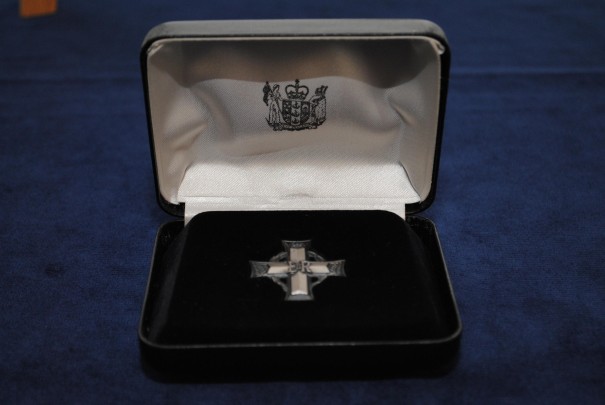New Zealand Memorial Cross

To view more images, click here
Welcome remarks
Nga mihi o te ra ki a koutou. Greetings to you all.
I specifically acknowledge: Mary-Anne and Mark O’Donnell and Anna and Jason and Andrew and Katherine; the Rt Hon John Key, Prime Minister and Hon Dr Jonathan Coleman, Minister of Defence; Lt Gen Rhys Jones, Chief of the Defence Force and Major General Tim Keating, Chief of the Army—kia ora.
Janine and I welcome you all to Government House this afternoon for the presentation of this New Zealand Memorial Cross.
And to that end, I would now call on, Mary-Anne and Mark O’Donnell to come forward.
Concluding remarks
Mark and Mary-Anne O’Donnell and your family, distinguished guests, ladies and gentlemen, I will bring this ceremony to a close by outlining the significance of the Memorial Cross.
The New Zealand Memorial Cross is a special honour. It has been presented to the next of kin of all New Zealand servicemen and servicewomen killed while on war service or operational service overseas, or who subsequently died of wounds received in that service since the beginning of the Second World War. There are two versions of the Cross, the King George VI and Queen Elizabeth II Memorial Crosses. Over 11,000 Memorial Crosses were presented as a result of the Second World War, and more than 125 have been presented since that war ended on the 3rd September 1945.
The award of a Memorial Cross to the family of a deceased serviceman or servicewoman recognises that operational service is never borne by the service-member alone. Behind each of those serving in the Navy, Army or Air Force are families: mothers and fathers, brothers and sisters, husbands, wives, partners and children.
The New Zealand Defence Force endeavours to keep all those serving in its name safe. However, operational service is never without risk and, despite best efforts, some of our service personnel do not return.
One of those who did not return was Lt Tim O’Donnell DSD, who was killed in action in Bamyan province Afghanistan on 3 August 2010. He was a highly competent and widely liked young officer, who had won the Distinguished Service Decoration for his “outstanding performance of military duties” in Timor-Leste in 2007.
The regulations that establish the Memorial Cross specifically places precedence on the women in the serviceperson’s family - the mother, widow, daughters and sisters - to receive the Cross. The sentiment that underlies this position is best summarised in the final couplet of a poem by Oliver Wendell Holmes that goes:
Youth fades; love droops; the leaves of friendship fall:
A mother's secret hope outlives them all.
This Memorial Cross signifies the nation’s respect to the O’Donnell family and our recognition of their grief.
Please stand and join with me in singing the national anthem, God Defend New Zealand, in Māori and English.
